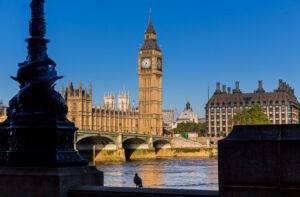
Business chiefs gathered in Parliament last night to discuss the UK’s new roadmap towards achieving net zero.
Speaking at the Parliament Street think tank’s sustainability summit on Monday night, which was hosted by Dean Russell MP for Watford and chaired by Steven George-Hilley of Centropy PR, the panel of experts debated the role businesses should play in improving the country’s green credentials.
Key speakers included Andy Howard, Global Head of Sustainable Investment at Schroders who debated role of regulation in cutting emissions and building a cleaner, greener planet.
Also in attendance were executives from tech firms Ad Signal and Storj, founding members of the newly launched Digital Sustainability Alliance. The organisation is calling on businesses to collaborate to drive industry change, especially around the use of technology to tackle the climate crisis.
Tom Dunning, CEO, Ad Signal said, “Data centres currently represent 2.3% to 3.7% of global CO2 emissions, due to reach 14% by 2040 which will exceed agriculture. AI is a major contributor to this, with 90% of applications due to use AI by 2030. The first challenge is the need for proper reporting from data centres and distributed computing networks; enabling people to make informed choices.
“We must identify the low hanging fruit of sustainability as well as the greatest risks. We believe that video storage and streaming, currently at 1.84% of the world’s CO2E, is the low hanging fruit and AI represents the greatest risk to meeting our sustainability goals. These are the aims, and our reason for being a founder, of the Digital Sustainability Alliance.”
John Gleeson, COO, Chief Operating Officer for Storj said: “The greenest data centre is the one that’s never built or expanded. Our technology leverages existing, unused storage capacity in tens of thousands of data centres all over the world. We reduce the carbon footprint of cloud storage by 60-80% primarily by avoiding the need to purchase new hard drives and extending the service life of the drives already in use.
“Since data centres represent nearly 3% of global carbon emissions, rapid enterprise adoption of green technologies like Storj can have an outsized impact, today. While the reality is that enterprises will only adopt new technologies that are significantly better than existing solutions, we’re experiencing rapid growth by delivering a cloud storage service that has not only a lower carbon footprint, but is more performant and 80% lower cost at the same time.”
Dr. Alan Hudd, founder of Alchemie Technology said: “Industrial processes such as textile dyeing contribute significantly to a worsening global climate. New technology solutions are known to have a big impact, and this is needed today and for the next ten years.
“We encourage governments to focus on creating incentives for planet-damaging industrial processes to introduce sustainable solutions, provide stronger regulations to tax importers of global polluters, and act on a global stage.
Peter Mildon, co-founder & COO at VivaCity Labs said: “The transport sector is accountable for over a quarter of the UK’s CO2 emissions, making it the largest contributor. We need to accelerate decarbonisation to mirror the success story of the Energy sector over the last decade. While the electrification of vehicles and encouraging more public transport usage are routes to achieving this, the most efficient and cost effective at a time of a cost of living crisis is through encouraging a modal shift to sustainable transport methods such as walking and cycling.
“VivaCity’s data enables road authorities to assess active travel usage and the safety of roads for these more vulnerable road users. This in turn enables authorities to target investment that saves lives by making our roads more equitable, easing the burden on both our plant and our wallets,” he added.
Read more:
Industry leaders debate UK’s net zero action plan in Parliament






